Business Law Case Study: Offer, Acceptance, and Revocation Analysis
VerifiedAdded on 2023/06/10
|8
|1907
|282
Case Study
AI Summary
This business law assignment presents a case study involving Nigel, Oliver, and Paul, focusing on contract law principles, specifically offer, acceptance, and revocation. Nigel's advertisement in "Antiques Monthly" is considered an invitation to treat. Oliver's initial offer of £12,000 was countered by Nigel's offer of £13,500, to be accepted in writing by Friday noon. Meanwhile, Nigel accepted Paul's offer of £14,000. Oliver's acceptance letter arrived at 1:00 PM on Friday, after Nigel had already revoked the offer, which Oliver received at 11:00 AM. The analysis concludes that no valid contract existed between Nigel and Oliver due to the late acceptance, and Nigel is not liable to Oliver. The contract between Nigel and Paul is deemed valid. The document references key cases such as Harvey v Facey, Carlill v Carbolic Smoke Ball co, and Dickinson v Dodds to support its legal arguments. Desklib provides similar solved assignments for students.
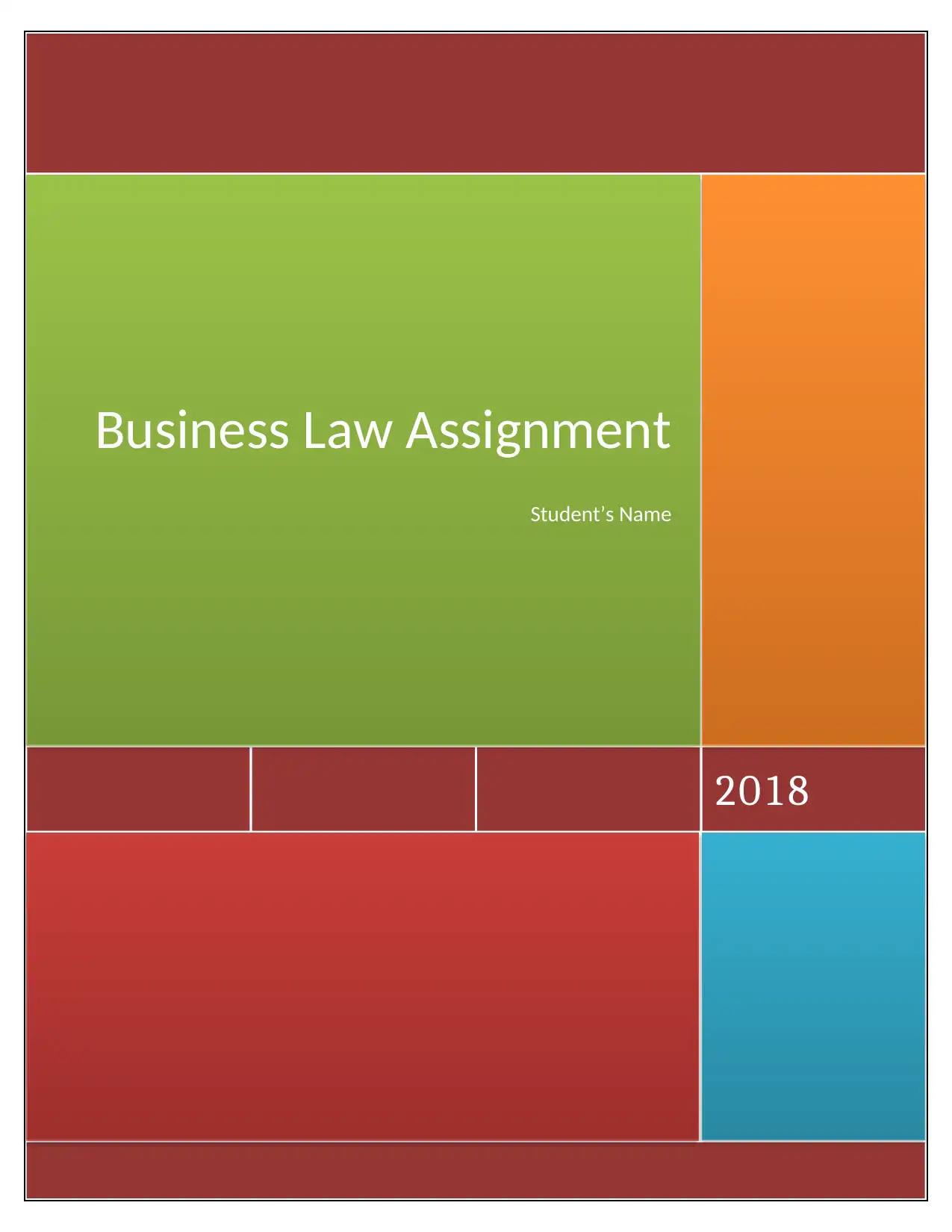
2018
Business Law Assignment
Student’s Name
Business Law Assignment
Student’s Name
Paraphrase This Document
Need a fresh take? Get an instant paraphrase of this document with our AI Paraphraser
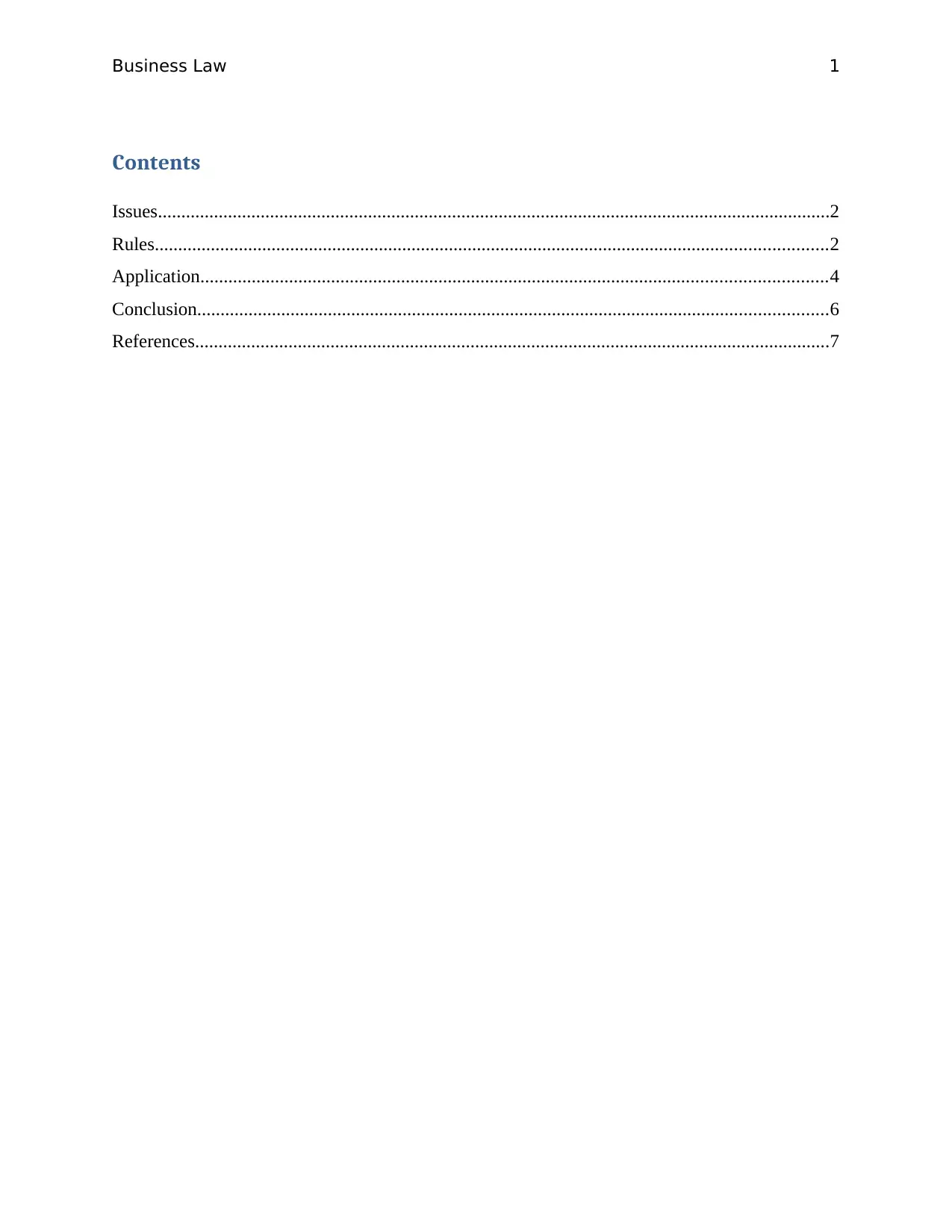
Business Law 1
Contents
Issues................................................................................................................................................2
Rules................................................................................................................................................2
Application......................................................................................................................................4
Conclusion.......................................................................................................................................6
References........................................................................................................................................7
Contents
Issues................................................................................................................................................2
Rules................................................................................................................................................2
Application......................................................................................................................................4
Conclusion.......................................................................................................................................6
References........................................................................................................................................7
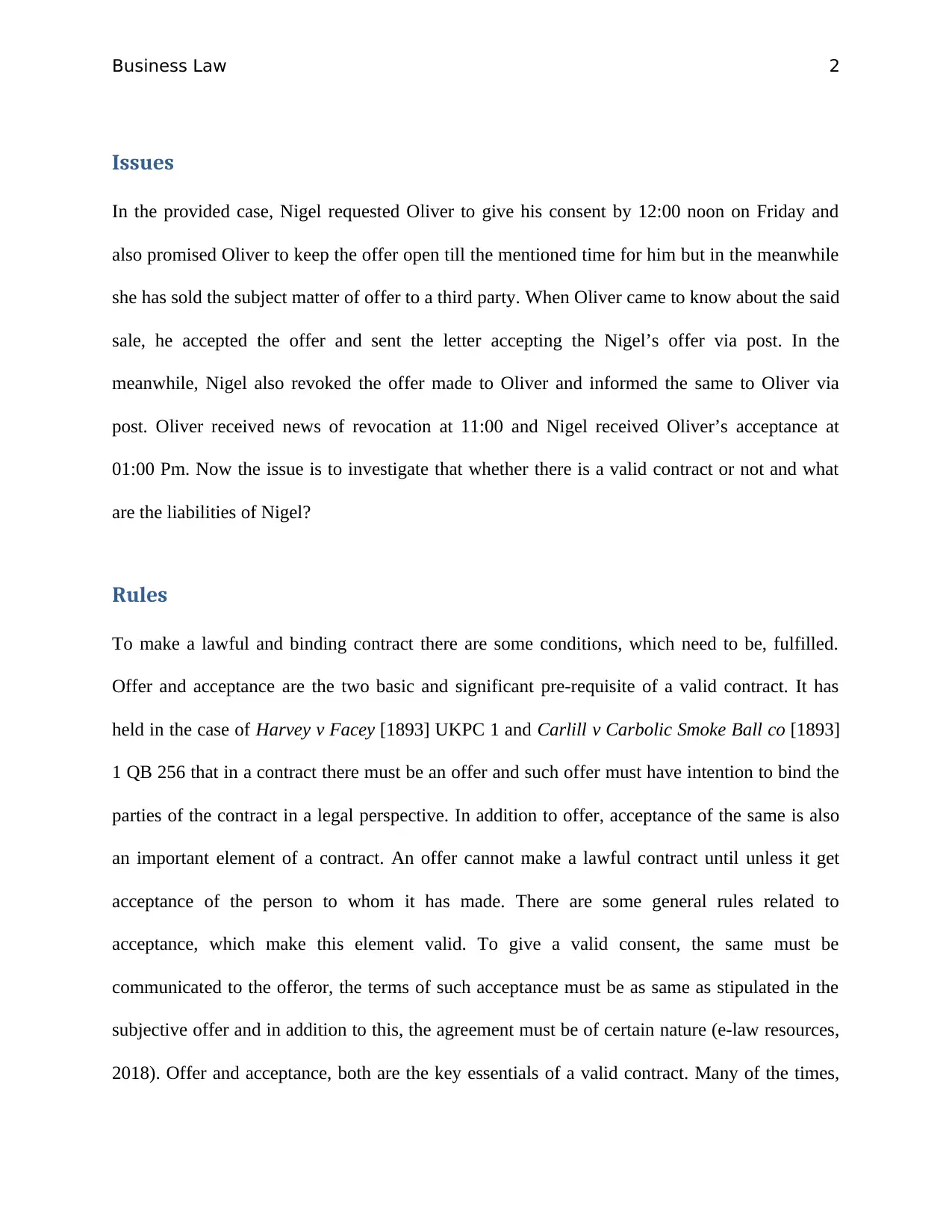
Business Law 2
Issues
In the provided case, Nigel requested Oliver to give his consent by 12:00 noon on Friday and
also promised Oliver to keep the offer open till the mentioned time for him but in the meanwhile
she has sold the subject matter of offer to a third party. When Oliver came to know about the said
sale, he accepted the offer and sent the letter accepting the Nigel’s offer via post. In the
meanwhile, Nigel also revoked the offer made to Oliver and informed the same to Oliver via
post. Oliver received news of revocation at 11:00 and Nigel received Oliver’s acceptance at
01:00 Pm. Now the issue is to investigate that whether there is a valid contract or not and what
are the liabilities of Nigel?
Rules
To make a lawful and binding contract there are some conditions, which need to be, fulfilled.
Offer and acceptance are the two basic and significant pre-requisite of a valid contract. It has
held in the case of Harvey v Facey [1893] UKPC 1 and Carlill v Carbolic Smoke Ball co [1893]
1 QB 256 that in a contract there must be an offer and such offer must have intention to bind the
parties of the contract in a legal perspective. In addition to offer, acceptance of the same is also
an important element of a contract. An offer cannot make a lawful contract until unless it get
acceptance of the person to whom it has made. There are some general rules related to
acceptance, which make this element valid. To give a valid consent, the same must be
communicated to the offeror, the terms of such acceptance must be as same as stipulated in the
subjective offer and in addition to this, the agreement must be of certain nature (e-law resources,
2018). Offer and acceptance, both are the key essentials of a valid contract. Many of the times,
Issues
In the provided case, Nigel requested Oliver to give his consent by 12:00 noon on Friday and
also promised Oliver to keep the offer open till the mentioned time for him but in the meanwhile
she has sold the subject matter of offer to a third party. When Oliver came to know about the said
sale, he accepted the offer and sent the letter accepting the Nigel’s offer via post. In the
meanwhile, Nigel also revoked the offer made to Oliver and informed the same to Oliver via
post. Oliver received news of revocation at 11:00 and Nigel received Oliver’s acceptance at
01:00 Pm. Now the issue is to investigate that whether there is a valid contract or not and what
are the liabilities of Nigel?
Rules
To make a lawful and binding contract there are some conditions, which need to be, fulfilled.
Offer and acceptance are the two basic and significant pre-requisite of a valid contract. It has
held in the case of Harvey v Facey [1893] UKPC 1 and Carlill v Carbolic Smoke Ball co [1893]
1 QB 256 that in a contract there must be an offer and such offer must have intention to bind the
parties of the contract in a legal perspective. In addition to offer, acceptance of the same is also
an important element of a contract. An offer cannot make a lawful contract until unless it get
acceptance of the person to whom it has made. There are some general rules related to
acceptance, which make this element valid. To give a valid consent, the same must be
communicated to the offeror, the terms of such acceptance must be as same as stipulated in the
subjective offer and in addition to this, the agreement must be of certain nature (e-law resources,
2018). Offer and acceptance, both are the key essentials of a valid contract. Many of the times,
⊘ This is a preview!⊘
Do you want full access?
Subscribe today to unlock all pages.

Trusted by 1+ million students worldwide
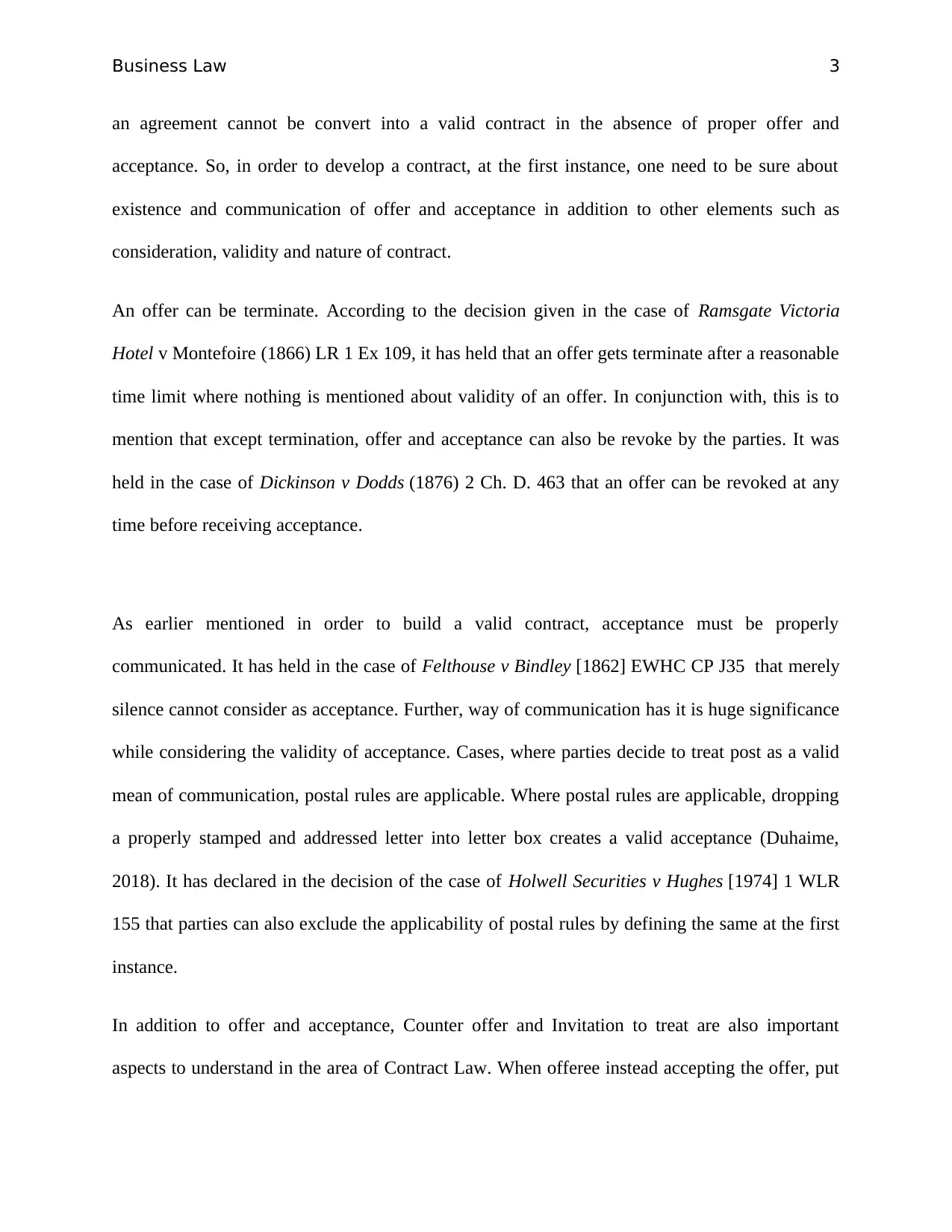
Business Law 3
an agreement cannot be convert into a valid contract in the absence of proper offer and
acceptance. So, in order to develop a contract, at the first instance, one need to be sure about
existence and communication of offer and acceptance in addition to other elements such as
consideration, validity and nature of contract.
An offer can be terminate. According to the decision given in the case of Ramsgate Victoria
Hotel v Montefoire (1866) LR 1 Ex 109, it has held that an offer gets terminate after a reasonable
time limit where nothing is mentioned about validity of an offer. In conjunction with, this is to
mention that except termination, offer and acceptance can also be revoke by the parties. It was
held in the case of Dickinson v Dodds (1876) 2 Ch. D. 463 that an offer can be revoked at any
time before receiving acceptance.
As earlier mentioned in order to build a valid contract, acceptance must be properly
communicated. It has held in the case of Felthouse v Bindley [1862] EWHC CP J35 that merely
silence cannot consider as acceptance. Further, way of communication has it is huge significance
while considering the validity of acceptance. Cases, where parties decide to treat post as a valid
mean of communication, postal rules are applicable. Where postal rules are applicable, dropping
a properly stamped and addressed letter into letter box creates a valid acceptance (Duhaime,
2018). It has declared in the decision of the case of Holwell Securities v Hughes [1974] 1 WLR
155 that parties can also exclude the applicability of postal rules by defining the same at the first
instance.
In addition to offer and acceptance, Counter offer and Invitation to treat are also important
aspects to understand in the area of Contract Law. When offeree instead accepting the offer, put
an agreement cannot be convert into a valid contract in the absence of proper offer and
acceptance. So, in order to develop a contract, at the first instance, one need to be sure about
existence and communication of offer and acceptance in addition to other elements such as
consideration, validity and nature of contract.
An offer can be terminate. According to the decision given in the case of Ramsgate Victoria
Hotel v Montefoire (1866) LR 1 Ex 109, it has held that an offer gets terminate after a reasonable
time limit where nothing is mentioned about validity of an offer. In conjunction with, this is to
mention that except termination, offer and acceptance can also be revoke by the parties. It was
held in the case of Dickinson v Dodds (1876) 2 Ch. D. 463 that an offer can be revoked at any
time before receiving acceptance.
As earlier mentioned in order to build a valid contract, acceptance must be properly
communicated. It has held in the case of Felthouse v Bindley [1862] EWHC CP J35 that merely
silence cannot consider as acceptance. Further, way of communication has it is huge significance
while considering the validity of acceptance. Cases, where parties decide to treat post as a valid
mean of communication, postal rules are applicable. Where postal rules are applicable, dropping
a properly stamped and addressed letter into letter box creates a valid acceptance (Duhaime,
2018). It has declared in the decision of the case of Holwell Securities v Hughes [1974] 1 WLR
155 that parties can also exclude the applicability of postal rules by defining the same at the first
instance.
In addition to offer and acceptance, Counter offer and Invitation to treat are also important
aspects to understand in the area of Contract Law. When offeree instead accepting the offer, put
Paraphrase This Document
Need a fresh take? Get an instant paraphrase of this document with our AI Paraphraser
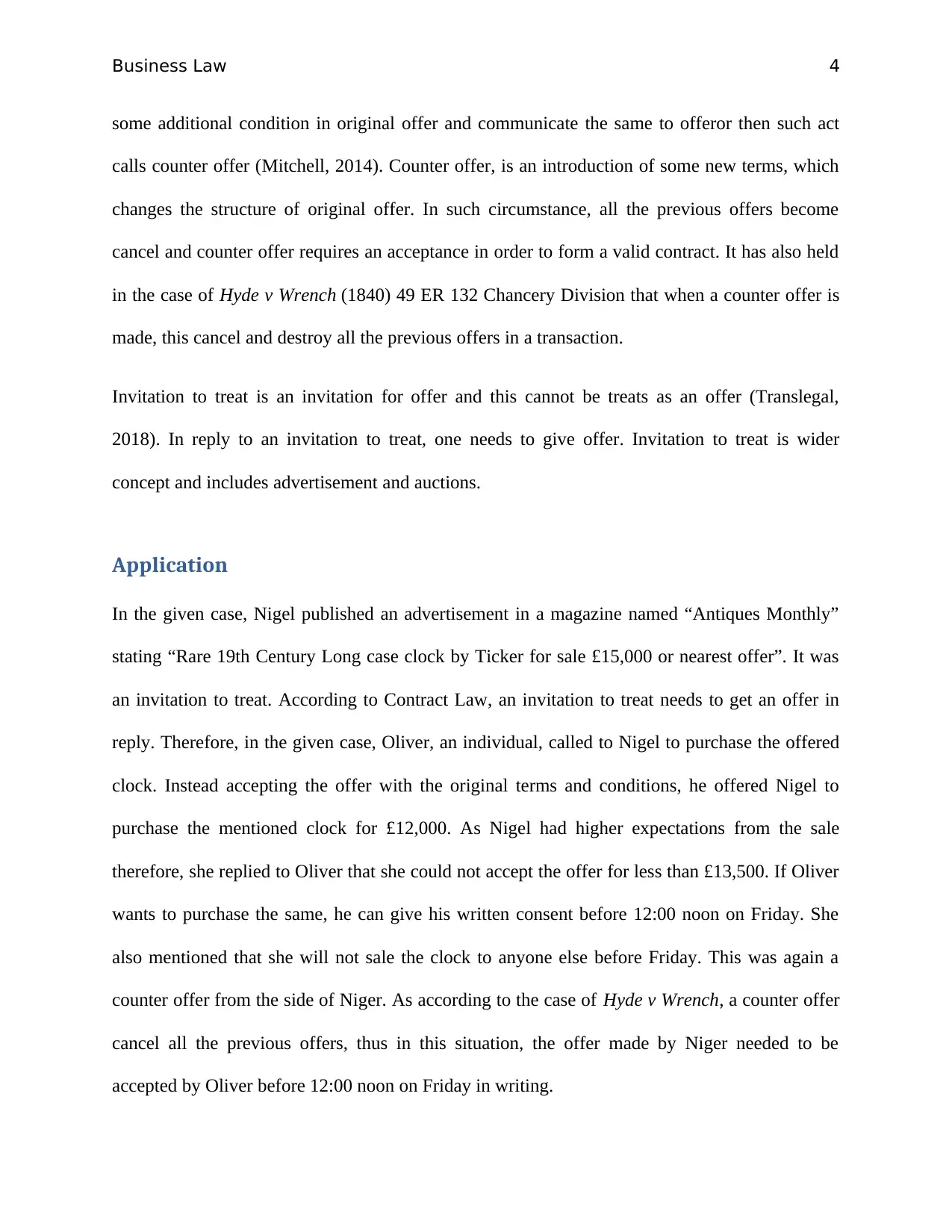
Business Law 4
some additional condition in original offer and communicate the same to offeror then such act
calls counter offer (Mitchell, 2014). Counter offer, is an introduction of some new terms, which
changes the structure of original offer. In such circumstance, all the previous offers become
cancel and counter offer requires an acceptance in order to form a valid contract. It has also held
in the case of Hyde v Wrench (1840) 49 ER 132 Chancery Division that when a counter offer is
made, this cancel and destroy all the previous offers in a transaction.
Invitation to treat is an invitation for offer and this cannot be treats as an offer (Translegal,
2018). In reply to an invitation to treat, one needs to give offer. Invitation to treat is wider
concept and includes advertisement and auctions.
Application
In the given case, Nigel published an advertisement in a magazine named “Antiques Monthly”
stating “Rare 19th Century Long case clock by Ticker for sale £15,000 or nearest offer”. It was
an invitation to treat. According to Contract Law, an invitation to treat needs to get an offer in
reply. Therefore, in the given case, Oliver, an individual, called to Nigel to purchase the offered
clock. Instead accepting the offer with the original terms and conditions, he offered Nigel to
purchase the mentioned clock for £12,000. As Nigel had higher expectations from the sale
therefore, she replied to Oliver that she could not accept the offer for less than £13,500. If Oliver
wants to purchase the same, he can give his written consent before 12:00 noon on Friday. She
also mentioned that she will not sale the clock to anyone else before Friday. This was again a
counter offer from the side of Niger. As according to the case of Hyde v Wrench, a counter offer
cancel all the previous offers, thus in this situation, the offer made by Niger needed to be
accepted by Oliver before 12:00 noon on Friday in writing.
some additional condition in original offer and communicate the same to offeror then such act
calls counter offer (Mitchell, 2014). Counter offer, is an introduction of some new terms, which
changes the structure of original offer. In such circumstance, all the previous offers become
cancel and counter offer requires an acceptance in order to form a valid contract. It has also held
in the case of Hyde v Wrench (1840) 49 ER 132 Chancery Division that when a counter offer is
made, this cancel and destroy all the previous offers in a transaction.
Invitation to treat is an invitation for offer and this cannot be treats as an offer (Translegal,
2018). In reply to an invitation to treat, one needs to give offer. Invitation to treat is wider
concept and includes advertisement and auctions.
Application
In the given case, Nigel published an advertisement in a magazine named “Antiques Monthly”
stating “Rare 19th Century Long case clock by Ticker for sale £15,000 or nearest offer”. It was
an invitation to treat. According to Contract Law, an invitation to treat needs to get an offer in
reply. Therefore, in the given case, Oliver, an individual, called to Nigel to purchase the offered
clock. Instead accepting the offer with the original terms and conditions, he offered Nigel to
purchase the mentioned clock for £12,000. As Nigel had higher expectations from the sale
therefore, she replied to Oliver that she could not accept the offer for less than £13,500. If Oliver
wants to purchase the same, he can give his written consent before 12:00 noon on Friday. She
also mentioned that she will not sale the clock to anyone else before Friday. This was again a
counter offer from the side of Niger. As according to the case of Hyde v Wrench, a counter offer
cancel all the previous offers, thus in this situation, the offer made by Niger needed to be
accepted by Oliver before 12:00 noon on Friday in writing.
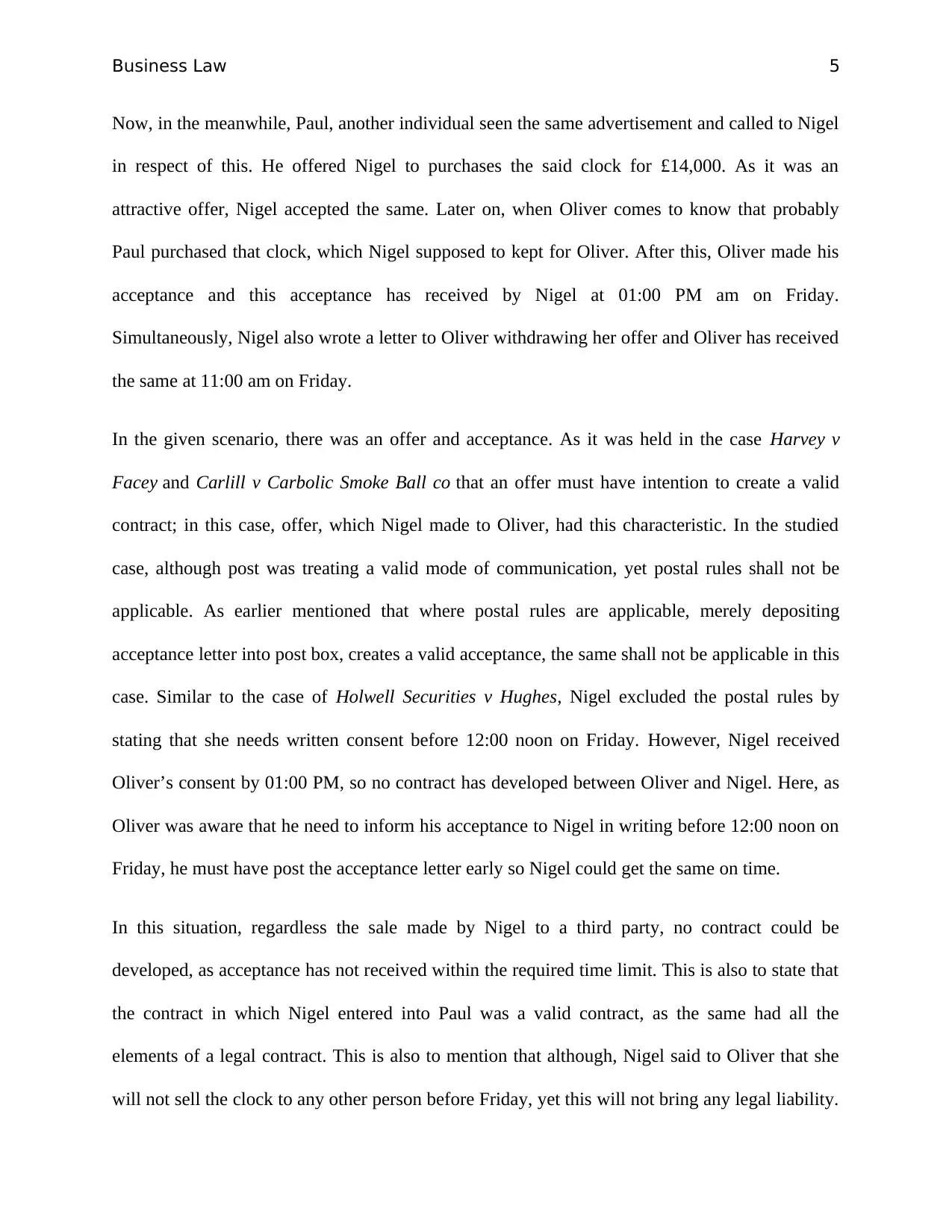
Business Law 5
Now, in the meanwhile, Paul, another individual seen the same advertisement and called to Nigel
in respect of this. He offered Nigel to purchases the said clock for £14,000. As it was an
attractive offer, Nigel accepted the same. Later on, when Oliver comes to know that probably
Paul purchased that clock, which Nigel supposed to kept for Oliver. After this, Oliver made his
acceptance and this acceptance has received by Nigel at 01:00 PM am on Friday.
Simultaneously, Nigel also wrote a letter to Oliver withdrawing her offer and Oliver has received
the same at 11:00 am on Friday.
In the given scenario, there was an offer and acceptance. As it was held in the case Harvey v
Facey and Carlill v Carbolic Smoke Ball co that an offer must have intention to create a valid
contract; in this case, offer, which Nigel made to Oliver, had this characteristic. In the studied
case, although post was treating a valid mode of communication, yet postal rules shall not be
applicable. As earlier mentioned that where postal rules are applicable, merely depositing
acceptance letter into post box, creates a valid acceptance, the same shall not be applicable in this
case. Similar to the case of Holwell Securities v Hughes, Nigel excluded the postal rules by
stating that she needs written consent before 12:00 noon on Friday. However, Nigel received
Oliver’s consent by 01:00 PM, so no contract has developed between Oliver and Nigel. Here, as
Oliver was aware that he need to inform his acceptance to Nigel in writing before 12:00 noon on
Friday, he must have post the acceptance letter early so Nigel could get the same on time.
In this situation, regardless the sale made by Nigel to a third party, no contract could be
developed, as acceptance has not received within the required time limit. This is also to state that
the contract in which Nigel entered into Paul was a valid contract, as the same had all the
elements of a legal contract. This is also to mention that although, Nigel said to Oliver that she
will not sell the clock to any other person before Friday, yet this will not bring any legal liability.
Now, in the meanwhile, Paul, another individual seen the same advertisement and called to Nigel
in respect of this. He offered Nigel to purchases the said clock for £14,000. As it was an
attractive offer, Nigel accepted the same. Later on, when Oliver comes to know that probably
Paul purchased that clock, which Nigel supposed to kept for Oliver. After this, Oliver made his
acceptance and this acceptance has received by Nigel at 01:00 PM am on Friday.
Simultaneously, Nigel also wrote a letter to Oliver withdrawing her offer and Oliver has received
the same at 11:00 am on Friday.
In the given scenario, there was an offer and acceptance. As it was held in the case Harvey v
Facey and Carlill v Carbolic Smoke Ball co that an offer must have intention to create a valid
contract; in this case, offer, which Nigel made to Oliver, had this characteristic. In the studied
case, although post was treating a valid mode of communication, yet postal rules shall not be
applicable. As earlier mentioned that where postal rules are applicable, merely depositing
acceptance letter into post box, creates a valid acceptance, the same shall not be applicable in this
case. Similar to the case of Holwell Securities v Hughes, Nigel excluded the postal rules by
stating that she needs written consent before 12:00 noon on Friday. However, Nigel received
Oliver’s consent by 01:00 PM, so no contract has developed between Oliver and Nigel. Here, as
Oliver was aware that he need to inform his acceptance to Nigel in writing before 12:00 noon on
Friday, he must have post the acceptance letter early so Nigel could get the same on time.
In this situation, regardless the sale made by Nigel to a third party, no contract could be
developed, as acceptance has not received within the required time limit. This is also to state that
the contract in which Nigel entered into Paul was a valid contract, as the same had all the
elements of a legal contract. This is also to mention that although, Nigel said to Oliver that she
will not sell the clock to any other person before Friday, yet this will not bring any legal liability.
⊘ This is a preview!⊘
Do you want full access?
Subscribe today to unlock all pages.

Trusted by 1+ million students worldwide
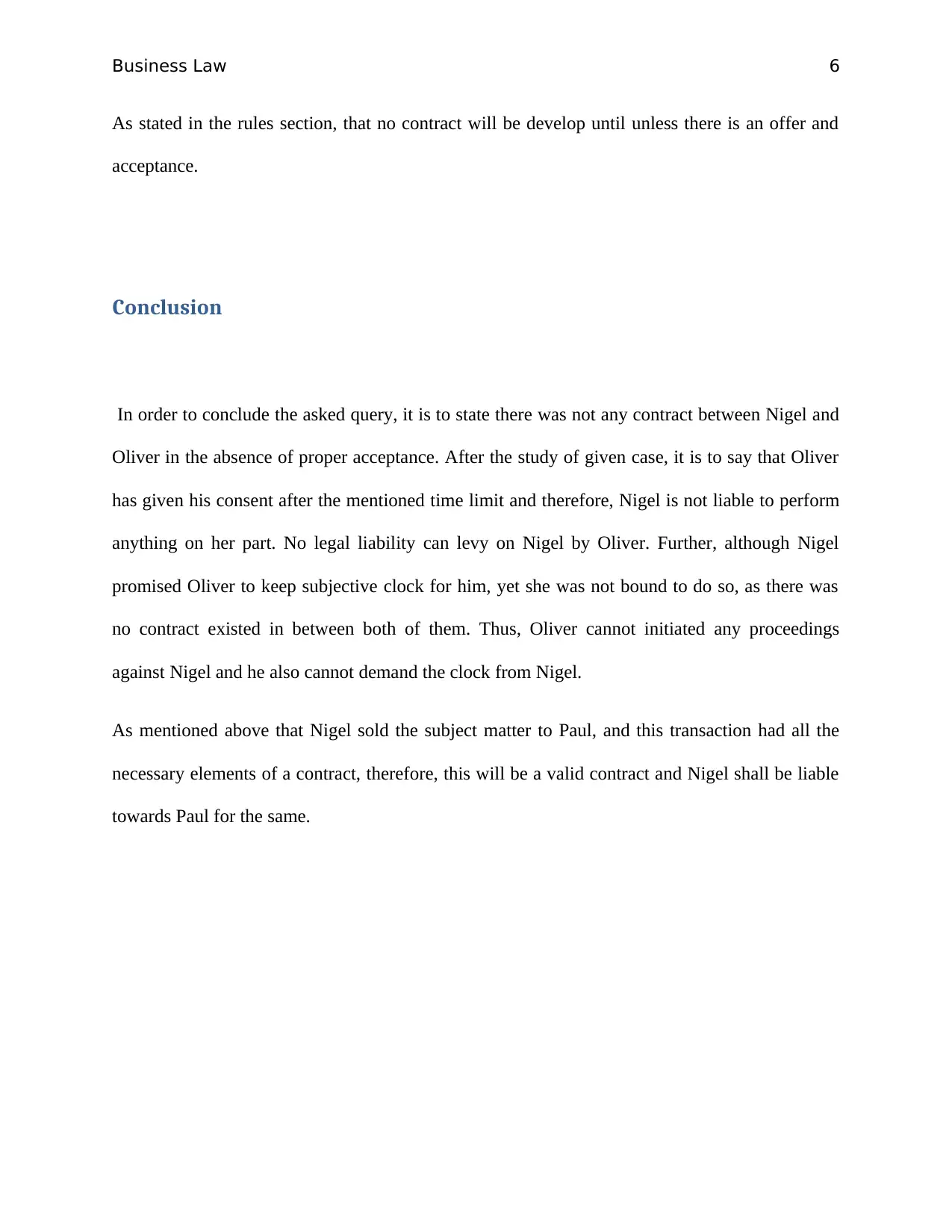
Business Law 6
As stated in the rules section, that no contract will be develop until unless there is an offer and
acceptance.
Conclusion
In order to conclude the asked query, it is to state there was not any contract between Nigel and
Oliver in the absence of proper acceptance. After the study of given case, it is to say that Oliver
has given his consent after the mentioned time limit and therefore, Nigel is not liable to perform
anything on her part. No legal liability can levy on Nigel by Oliver. Further, although Nigel
promised Oliver to keep subjective clock for him, yet she was not bound to do so, as there was
no contract existed in between both of them. Thus, Oliver cannot initiated any proceedings
against Nigel and he also cannot demand the clock from Nigel.
As mentioned above that Nigel sold the subject matter to Paul, and this transaction had all the
necessary elements of a contract, therefore, this will be a valid contract and Nigel shall be liable
towards Paul for the same.
As stated in the rules section, that no contract will be develop until unless there is an offer and
acceptance.
Conclusion
In order to conclude the asked query, it is to state there was not any contract between Nigel and
Oliver in the absence of proper acceptance. After the study of given case, it is to say that Oliver
has given his consent after the mentioned time limit and therefore, Nigel is not liable to perform
anything on her part. No legal liability can levy on Nigel by Oliver. Further, although Nigel
promised Oliver to keep subjective clock for him, yet she was not bound to do so, as there was
no contract existed in between both of them. Thus, Oliver cannot initiated any proceedings
against Nigel and he also cannot demand the clock from Nigel.
As mentioned above that Nigel sold the subject matter to Paul, and this transaction had all the
necessary elements of a contract, therefore, this will be a valid contract and Nigel shall be liable
towards Paul for the same.
Paraphrase This Document
Need a fresh take? Get an instant paraphrase of this document with our AI Paraphraser
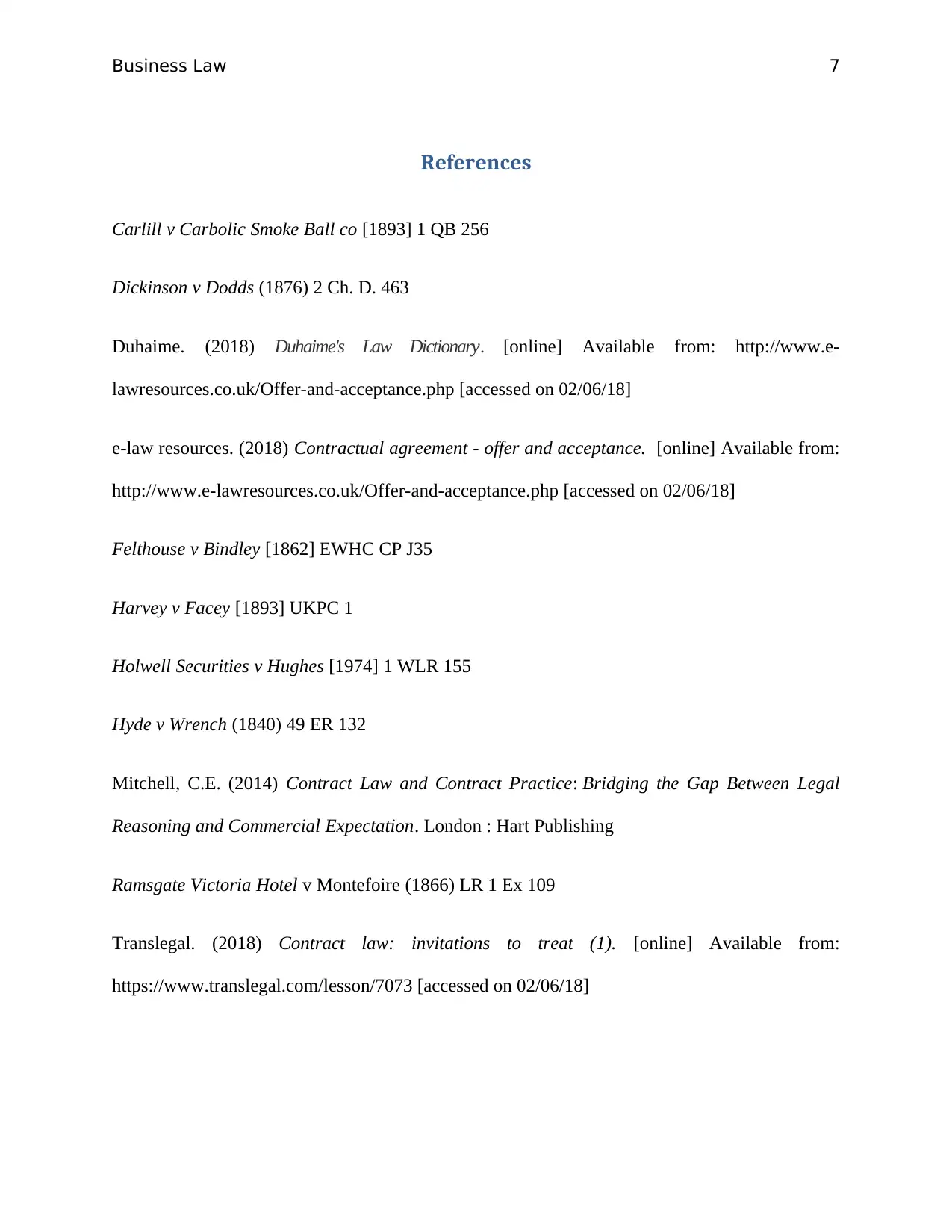
Business Law 7
References
Carlill v Carbolic Smoke Ball co [1893] 1 QB 256
Dickinson v Dodds (1876) 2 Ch. D. 463
Duhaime. (2018) Duhaime's Law Dictionary. [online] Available from: http://www.e-
lawresources.co.uk/Offer-and-acceptance.php [accessed on 02/06/18]
e-law resources. (2018) Contractual agreement - offer and acceptance. [online] Available from:
http://www.e-lawresources.co.uk/Offer-and-acceptance.php [accessed on 02/06/18]
Felthouse v Bindley [1862] EWHC CP J35
Harvey v Facey [1893] UKPC 1
Holwell Securities v Hughes [1974] 1 WLR 155
Hyde v Wrench (1840) 49 ER 132
Mitchell, C.E. (2014) Contract Law and Contract Practice: Bridging the Gap Between Legal
Reasoning and Commercial Expectation. London : Hart Publishing
Ramsgate Victoria Hotel v Montefoire (1866) LR 1 Ex 109
Translegal. (2018) Contract law: invitations to treat (1). [online] Available from:
https://www.translegal.com/lesson/7073 [accessed on 02/06/18]
References
Carlill v Carbolic Smoke Ball co [1893] 1 QB 256
Dickinson v Dodds (1876) 2 Ch. D. 463
Duhaime. (2018) Duhaime's Law Dictionary. [online] Available from: http://www.e-
lawresources.co.uk/Offer-and-acceptance.php [accessed on 02/06/18]
e-law resources. (2018) Contractual agreement - offer and acceptance. [online] Available from:
http://www.e-lawresources.co.uk/Offer-and-acceptance.php [accessed on 02/06/18]
Felthouse v Bindley [1862] EWHC CP J35
Harvey v Facey [1893] UKPC 1
Holwell Securities v Hughes [1974] 1 WLR 155
Hyde v Wrench (1840) 49 ER 132
Mitchell, C.E. (2014) Contract Law and Contract Practice: Bridging the Gap Between Legal
Reasoning and Commercial Expectation. London : Hart Publishing
Ramsgate Victoria Hotel v Montefoire (1866) LR 1 Ex 109
Translegal. (2018) Contract law: invitations to treat (1). [online] Available from:
https://www.translegal.com/lesson/7073 [accessed on 02/06/18]
1 out of 8
Related Documents
Your All-in-One AI-Powered Toolkit for Academic Success.
+13062052269
info@desklib.com
Available 24*7 on WhatsApp / Email
![[object Object]](/_next/static/media/star-bottom.7253800d.svg)
Unlock your academic potential
Copyright © 2020–2026 A2Z Services. All Rights Reserved. Developed and managed by ZUCOL.




